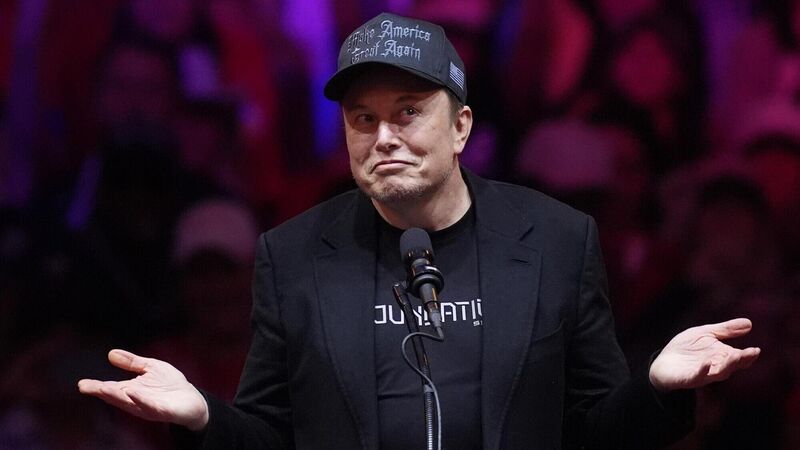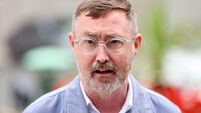'Lying like hell': Elon Musk extends online attacks on EU countries to Ireland

Elon Musk's latest outburst follows serious allegations he made against Labour government ministers over 'grooming gangs' in Britain. Picture: AP/Evan Vucci
Elon Musk’s online attacks on European countries has spread to Ireland, with the tech billionaire alleging that Irish nationals get “longer sentences” than so-called ‘illegal immigrants’ in Ireland for sex offences.
The owner of X, and close ally of incoming US president Donald Trump, said this was “messed up”.
He based his claims on a post put up by a well-known Irish far-right agitator, who alleged that, for over 20 years, “Muslim illegal immigrants have been handed lesser sentences for raping women in Ireland”.
This agitator cited a court case — from 23 years ago — in which the judge told the defendant, an asylum seeker from Algeria, that he was giving him six years in jail, rather than 10 years, as a prison sentence in an Irish jail would be more difficult and alien for him than for an Irish citizen.
Mr Musk quoted the post and said: “Irish citizens get longer sentences than illegal immigrants. That’s messed up.”
His outburst follows interventions in British politics and German elections.
He has made serious allegations against Labour government ministers over ‘grooming gangs’ in Britain and called on the right-wing Reform UK party to replace its leader, Nigel Farage.
In Germany, he has openly backed the far-right AFD party in next month’s elections. Yesterday evening he held a live-streamed discussion with AFD leader on his X platform, where he has more than 200m followers.
The European Commission has warned Mr Musk about not breaching EU laws on amplifying harmful content — such as racist hate speech — and are watching to see if he uses X algorithms to artificially boost the prominence of the interview and unduly interfere in an EU election.
Mr Musk said the EU was trying to “stop” the interview and added: “These guys really hate democracy.”
It prompted former EU commissioner Thierry Breton to accuse Mr Musk of “lying like hell”.
Mr Musk’s post about Irish sentencing has so far attracted over 6.4m views, 58,000 likes, 13,000 reposts, and 2,500 replies.
Alan Greene, reader in constitutional law and human rights at Birmingham Law School, said Mr Musk was “drawing from a case dated from August 2001 — well over 20 years ago”.
He said judges have considerable discretion on sentences and can take in many factors: “The Ireland of 2001 is a very different place to the Ireland of today and so a judge taking into account the difficulties a non-Irish person would have had in a prison then, does not necessarily mean that they would do so today.”
Mr Greene said 2022 statistics show non-Irish citizens comprised 22% of all committals to prison, compared to 12% of the total population, indicating they were “disproportionately represented”.
He said politicians and general society need to be more alert to the “dangers of misinformation and disinformation online, and bad faith actors who seek to cherry-pick cases and data points to paint an inaccurate picture of the Irish criminal justice system”.
He added: “This issue also underlines the importance of state authorities publishing accurate data to counter the threat of fake news.”
Eileen Culloty, assistant professor at DCU School of Communications, said: “Musk has secured his business interests in the US by aligning himself with Trump and putting deregulation at the centre of his agenda. Now he’s trying to control business rules in the EU and the UK by undermining democratic politics and aligning himself to friendly parties.
“His actions in Germany are most concerning as he’s directly interfering in an election. His promise to fund UK Reform is also very concerning from a democratic point of view. We’re now at a critical point for democracies.”
Asked about Mr Musk’s actions at the BT Young Scientists’ exhibition, Taoiseach Simon Harris said: “We now live in a world where we must face the reality that not only are comments going to happen about a country from within a country, but we’re also going to be hearing comments from outside countries.
“It’s important our citizens, our electorates, our electoral structures, and our electoral commission are aware [of] that reality. Social media is here to stay.”
CONNECT WITH US TODAY
Be the first to know the latest news and updates





